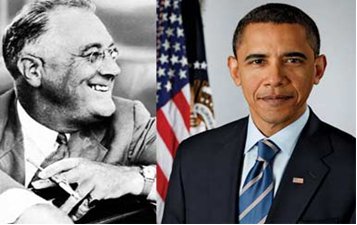Der amerikanische Autor und Edgar-Gewinner Thomas Adcock hat in den vergangenen Wochen exklusiv für CULTurMAG in einer wöchentlichen Kolumne den US-Wahlkampf begleitet. Nun steht die Entscheidung an, in den kommenden Stunden wird der nächste Präsident der Vereinigten Staaten gewählt. Warum sich Thomas Adcock wünscht, dass Barack Obama der Franklin Delano Roosevelt des 21.Jahrhunderts wird, lesen Sie hier.
Unifinished Business
If all goes well in today’s federal elections—I predict it shall—the rëelection of President Barack Obama and a thumping defeat for proto-fascist Tea Party commandants of the formerly respectable Republican Party should assure an anxious world that we Americans have not all lost our minds.
However . . .
There remains a crying need for Mr. Obama and supportive allies in the Congress to assure Americans here at home that they will attend to the nation’s unfinished business. Which is to say the “Second Bill of Rights,” a challenge for social progress set forth by the greatest president of the previous century—Franklin Delano Roosevelt (1882-1945), father of the modern Democratic Party.
During the long campaign season, Mr. Obama was criticized by his partisans for a lack of emphasis on big-picture domestic policy initiatives he would advocate in a second four-year term. “We must continue what we began,” was the incumbent’s preferred vagary.
To be fair, President Obama did achieve victory for at least one vital tenet of FDR’s eight-point challenge. He was dogged in pushing for adoption of the Affordable Care Act of 2010, which now begins the process of universal health care in the United States—civilizing legislation sought by many White House occupants, beginning with President Theodore Roosevelt, FDR’s cousin, who was the tenant from 1901-09. (Two years ago, every single Republican in the Congress voted against what they derided as “Obamacare,” now a badge of honor for the president.)
And when last week’s Hurricane Sandy wreaked havoc in the northeastern U.S., the nation’s most densely populated region, Mr. Obama seemed to have channeled FDR in giving us calm and sonorous reassurance that federal help was mighty, ungrudging, and on its way—and that all right-minded Americans were united in this emergency cause. Even the Republican governor of hard-hit New Jersey—Chris Christie, who gave a keynote address at last August’s Republican National Convention in Florida, the one that nominated Willard Mitt Romney as its presidential standard-bearer—heaped praise on Mr. Obama for his determined leadership during the worst disaster to hit America since the terrorist attacks of September 11th, 2001. (By contrast, Mr. Romney continued his hackneyed campaign, despite saying he would suspend same. At one point, Mr. Romney staged a photo-op stunt whereby he loaded up a rental van with canned food and boxes of Rice Krispies brand cereal for shipment to a nonprofit organization that specifically requests that donors contribute cash instead.)
•
But as for further good progress, there is no clearer path to continuance, as referenced by candidate Obama, than Mr. Roosevelt’s call of 1944. Accordingly, the Second Bill of Rights is the logical agenda for Mr. Obama and the Democrats to pursue.
Republicans will be in disarray for the next several years, engaged in internecine struggle with know-nothing thugs of the Tea Party cult they unwisely welcomed into their ranks—for cynical gain, now evaporated. Were he to vanquish his Republican opponent, Mr. Obama mused in a pre-election day television interview, “there’s going to be a war going on inside that party.”
This, then, is the moment for Democratic progress, à la FDR.
•
Sixty-eight years ago, in deliverance of an annual state of the union address, President Roosevelt sought to amend the Constitution with the addition of “a new basis of security and prosperity…for all, regardless of station, race, or creed.” He asked codification of individual economic rights of citizenship in America and the world, a canon that I would urge as a moral compass and legislative purpose for Mr. Obama and the Democrats.
Mr. Roosevelt’s idea was rejected by Republican Party obstructionists of his time. Today’s Republicans, cowed by racists and Tea Party corporate goons, would regard such talk of individual economic rights as Bolshevism. And yet, FDR’s Second Bill of Rights was incorporated into the new Constitutions of the Axis nations he defeated in World War II: Germany, Italy, and Japan.
During the now thankfully concluded presidential campaign, Americans were soothed and stirred by Mr. Obama’s rhetoric. We have returned him to office because we trust in that rhetoric. We admire the many and considerable accomplishments of his first term: among these, preventing economic chaos, the near result of the ongoing Great Recession brought about by Wall Street criminality and George W. Bush’s disastrous presidency; ending a pointless war in Iraq; decimating the terrorist ranks of al-Qaeda, including the rightful killing of Usama bin Laden; pledging a withdrawal of American troops from Afghanistan; adopting federal law to guarantee women equal pay for equal work.
We admire the dignity and grace of Mr. Obama and his wife, Michelle; and certainly the president’s fierce intelligence and sense of fairness. But we must now demand even more by way of Mr. Obama’s obvious love of country, and of us.
We must feel in our bones that he honors the best of our political history, which too many have consigned to a dead past; perhaps it hurts too much to hope that a forward spirit of sixty-eight years ago can rise again. We must feel in our hearts that our president understands how the Great Recession has profoundly damaged us, just as Mr. Roosevelt saw the same harms of hopelessness and disappointment and fear of poverty during the Great Depression of the 1930s.
We must trust that our president will not commit the sin of hesitant mercy.
We must ask Barack Obama to become this century’s FDR.
•
On the 11th of January 1944, sixteen months and a day before he passed, a gravely ill President Franklin D. Roosevelt summoned newsreel cameras to the Oval Office to record for posterity his economic prescription for an eventual postwar America.
“It is our duty now to begin to lay the plans and determine the strategy for the winning of a lasting peace, and the establishment of an American standard of living higher than ever before known,” said Mr. Roosevelt. “We cannot be content, no matter how high that general standard of living may be, if some fraction of our people—whether it be one-third or one-fifth or one-tenth—is ill-fed, ill-clothed, ill-housed, and insecure.”
Certain inalienable political guarantees—among these: freedom of speech, press, and religion; trial by jury; freedom from unreasonable searches and seizures—were settled in 1791 when Congress adopted the ten initial amendments to the Constitution, known as the Bill of Rights. But with the passage of one hundred-fifty years, FDR said in the newsreel address, “We have come to a clear realization of the fact that true individual freedom cannot exist without economic security and independence. Necessitous men are not free men.”
Mr. Roosevelt proposed eight more amendments as guarantors of necessary rights for an industrial and increasingly urban society, one so different than the agrarian United States of 1791:
• A useful and remunerative job
• Sufficient income for food, clothing, and recreation
• A decent living standard for family farms
• Fair business competition
• A decent home for every family
• Quality medical care for all
• Relief from the fears of old age, sickness, accident and unemployment
• A good education
“These rights spell security,” said FDR, in his confident, patrician manner of speech. For he was a man of the gentry, and of generosity; a “traitor to his class,” as wealthy men of his time damned him.
“And after this war is won,” the president went on, “we must be prepared to move forward in the implementation of these rights—to new goals of human happiness and well-being. America’s own rightful place in the world depends in large part upon how fully these and similar rights have been carried into practice for all our citizens.
“For unless there is security here at home, there cannot be lasting peace in the world.”
•
In 1944, congressional Republicans did not believe Americans should have such rights. To their shame, Republicans believe the same today; they side with powerful corporations, and fear the Tea Party shock troops they fund, in opposing any legislation aimed at economic security for working- and middle-class Americans.
The Republican Tea Party vision was made crystal clear during this presidential campaign: the wealthy must become wealthier, and taxed at half the rate of ordinary Americans; corporations must be allowed to deny jobs in the U.S. in favor of cheap labor abroad, in the interest of ever more profit for the few; trade unions and federal minimum wage law must be abolished; women should earn less on the job than men, and must be instructed by vagina-phobic politicians in what to do about unwanted pregnancies; regulation of Wall Street’s fraudulent conduct must be opposed; new immigrants must be barred from entry to the U.S., and those here demonized; the concerns of gays and lesbians are to be ridiculed; efficient government programs such as Social Security and Medicare must be privatized, with funds given over to Wall Street counting houses; the electoral franchise must be denied to the non-alabaster.
Among my global circle of friends are the beneficiaries of FDR’s completed vision. They are ordinary citizens of Germany, Italy, and Japan. Happily for them, facsimiles of the Second Bill of Rights were imposed on their countries in the cause of postwar social stability.
It seems to me that my friends abroad enjoy better, more fulfilling, and more secure lives than we do here in the U.S. This is not my opinion alone. Internet sites aimed at Americans considering the expatriate life are too numerous to mention, though one seems best at explaining the bottom line.
According to “Escaping America”— these are but a few reasons for leaving: superior medical care abroad, higher living standards, lower crime rates, better schools, modern public transportation, and longer life expectancy. But it was not ever so. Not so much earlier in my lifetime, America was a world destination for exactly these reasons—not to mention our music and our movies, which are still nonpareil.
Complainers though we may be, most of will forgo the expatriate option. We have marked ballots today for Mr. Obama, most of us. In so doing, we should realize that voting is the easy part of complaining.
Now comes the hard part: insisting, each day from this one forward, that our president hears us tell him, loudly:
We refuse to live in a country like this. And we are not leaving.
Copyright © 2012 by Thomas Adcock
THOMAS ADCOCK is a novelist and journalist based in New York City. Winner of the prestigious Edgar Allan Poe Award, given by Mystery Writers of America, his books and articles have been published worldwide. Writing as Tom Dey, he is currently completing a new novel titled “Lovers & Corpses.” Mehr zu Thomas Adcock hier und hier.












